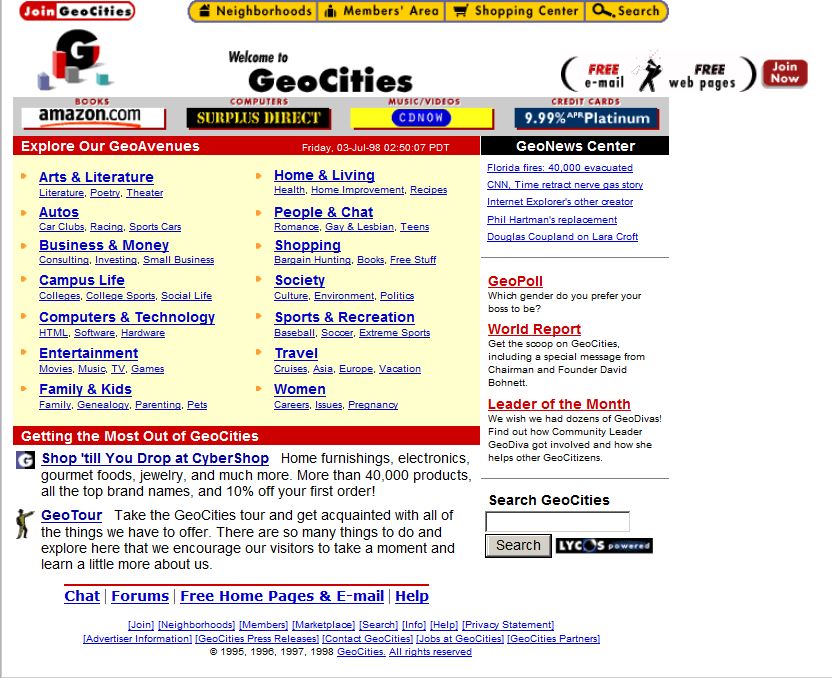Geocities Is Dead, Long Live Geocities - Let's make the web fun again
May 3, 2022
As we're building Nym, an open-source spiritual successor to GeoCities, we'd like to give thanks to our forebearers, internet services whose ideas have paved the path for us to build on.
Today we give thanks to Geocities, a very early web pioneer of social networking, blogging and personal media network.
The Life and Death of Geocities
Geocities has a fascinating history. It was once a thriving hub of activity, frequented by millions worldwide. Then it all came crashing down, like stars collapsing in the night sky. But even in the wake of its destruction, Geocities continues to fascinate those who remember it fondly—and even those who don't.
A Social Neighborhood on the Web
Geocities was one of the earliest social-web communities. Geocities websites were created by people from every walk of life, each site reflecting the personality of its author. In this way, it presaged later sites like Myspace and Facebook.
The Hit Counter
Our penchant for numbers never fails – and really, what’s the point of having a website if not to show people how popular you are? Since this couldn’t be measured in likes or followers at the time, many personal websites would put one of these bad boys at the bottom of the page:
A hit counter showing five zeros and a one. If you had a Geocities website, then you’ll remember the excitement when your counter went up 20 hits from when you last checked the site last night. “Wow, 20 people looked at my site? Who could they be?!?!!” Those were different days.

The Guest Book
An example of a guest book from Art Garfunkle's website. It seemed like the logic behind guestbooks was that people would surely want to leave a note before they left a website! After all, it’s only polite to announce your exit. Guestbooks have adapted and some people still put comments up on their sites, but now they’re usually curated and in the form of testimonials or praise (obviously).
Neighborhoods
 Instead of simply giving some web space in an anonymous corner of a server rack, they decided to divide up their free service into different virtual neighborhoods. Each “neighborhood” could host a different theme, and when users signed up they could choose which one they wanted to belong to. So the Hollywood neighborhood was the place for fan and celeb sites, Area51 for science fiction, and their own namesake, Beverly Hills, was reserved for fashion and shopping.
Instead of simply giving some web space in an anonymous corner of a server rack, they decided to divide up their free service into different virtual neighborhoods. Each “neighborhood” could host a different theme, and when users signed up they could choose which one they wanted to belong to. So the Hollywood neighborhood was the place for fan and celeb sites, Area51 for science fiction, and their own namesake, Beverly Hills, was reserved for fashion and shopping.
The Legacy of Geocities
When people start feeling nostalgic for Geocities, they always underscore it with a wince, recollecting the ostentatious graphics and animated GIFs and over the top layouts and scrolling text and under construction pages. People even associate aesthetic affronts and kitsch in web design with the word Geocities (as in Geocities-ize your website). To hear the traditional narrative tell it, the service got popular, and then its users got bored.
But there’s more to it.
The goal of Geocities was to provide a simple way for anyone to set up a home page on the Internet. Its founders were enthusiastic about what the web could do for people and created a site that reflected their passion. The founders used special interests and offbeat passions as seeds from which to grow online communities. People were encouraged to express themselves, not just with some pointless status box but however they wanted. Even if it was garish. Especially if it was garish. It was people all the way down.
Fortunately, the Archive Team gathered together for the very first time in a last ditch effort to save the site. Little by little, they downloaded all of Geocities into a single, massive torrent (~650GB in all). It’s available for download, and archived on the web in a few different places. That’s a good thing, but it’s still just a punctuation mark that closes out this story.
Need help finding your old site? Search the archive here
The Legacy of Geocities
When people start feeling nostalgic for Geocities, they always underscore it with a wince, recollecting the ostentatious graphics and animated GIFs and over the top layouts and scrolling text and under construction pages. People even associate aesthetic affronts and kitsch in web design with the word Geocities (as in Geocities-ize your website). To hear the traditional narrative tell it, the service got popular, and then its users got bored.

Have a site that you built back in the day? Link to your Geocities site in the comments! 👇👇